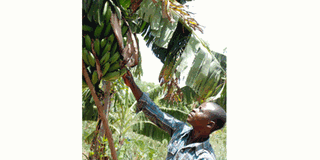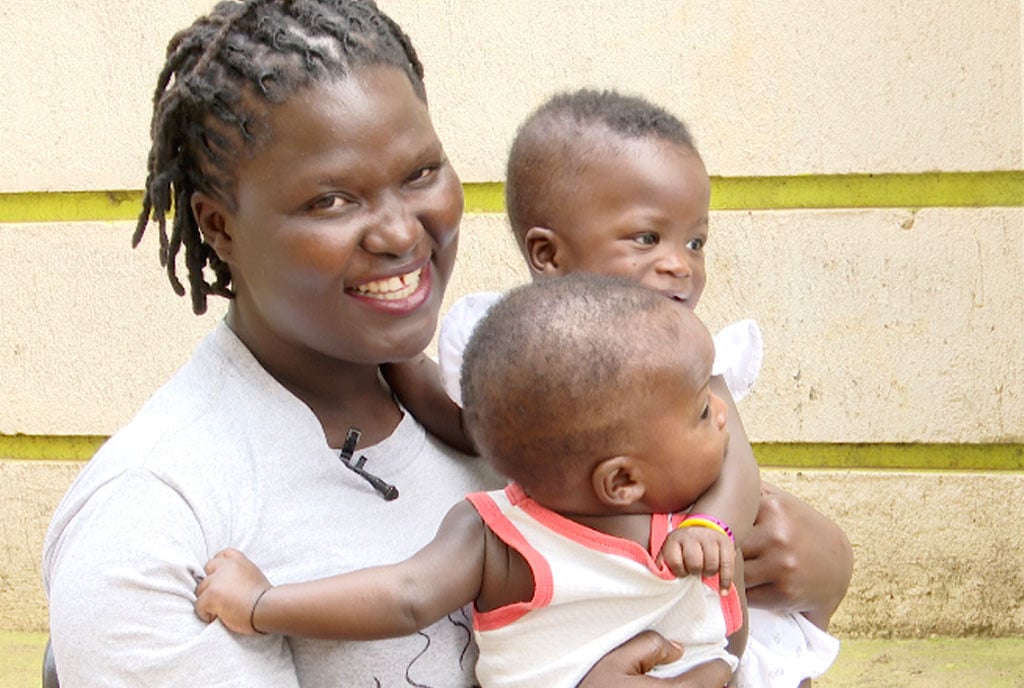Prime
A matooke farmer with big plans for the future

Making use of a research project on banana, Ssegawa was able to establish his banana plantation to both earn income and ensure food security for his household. Photo by Edgar R. Batte
The dry spell affected his banana plantation and caused him losses but Farouque Ssegawa can still bank on other crops and varieties.
At 25 years old, Farouque Ssegawa is competing with farmers, men and women, who are old enough to call him grandson. But for him, this is an opportunity to learn from them, compete with them and even advise them at some point.
He grows matooke and not just one type but many, which allows him an opportunity to talk about them in a sort of expert way.
Ssegawa is a beneficiary of a research project on bananas/matooke by the National Agricultural Research Organisation (Naro) at Mukono Zonal Agricultural Research and Development Institute (Muzardi).
He mainly grows two types of matooke, Mbwazirume and Mpologoma, but says each has an advantage over the other. “Mpologoma gives me bigger fingers and is tastier while Mbwazirume is resistant to drought and pests like nematodes,” he says, adding that Mbwazirume survived the dry conditions that have recently hit Kiboga.
Richard Lumu, Muzardi’s livestock field technician, explains that whereas new varieties like Mbwazirume are not as tasty as Mpologoma, they have been helpful in strengthening food security in rural areas that have been hit by the dry spell.
“These are varieties promoted by Naro-Muzardi. They are the M7 varieties that we came up with. There are seven of them,” he explains.
Muzardi’s Public Relations Officer, Maria Nampeera, says, “One of the objectives of these banana projects is to extend agricultural research technologies to the rural communities, for example in Kiboga, in order to observe how they perform within the farmer fields and to improve on food security.”
There is also an element of developing the farmer communities through sale of such products. Therefore by so doing, the farmers are able to evaluate the technologies and select the best variety to adopt for food security.
Surviving the dry spell
Ssegawa began growing matooke two years ago when he planted 1,508 stems. His harvest fetched him Shs500,000.
“When I go to sell bunches in the market, I fetch more with Mpologoma. It has a bigger bunch and can fetch me up to Shs25,000 a bunch,” he says but is quick to add that the variety has suffered during the recent dry spell since it is more favoured by the wet season.
“While I lost with Mpologoma, Mbwazirume fed my family of a wife, grandmother and child,” he adds.
On the edge of his garden, he planted trees to break the strong winds that sometimes will destroy his matooke plants, thereby leading to losses. But while this young farmer counted his losses, the onions he grows saved the day.
A basket from the one and a half acre on which he grows onions, can sell for at Shs20,000 each in the market. “Onions are a crop that you can grow and be able to reap in a short time,” says the young farmer, who also plants tomatoes.
In five years’ time, Ssegawa hopes he will have bought more land to expand his garden and matooke project because the prices are encouraging and despite the changing weather patterns, the drought-resistant varieties will still be able to yield.




